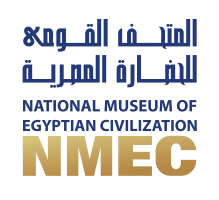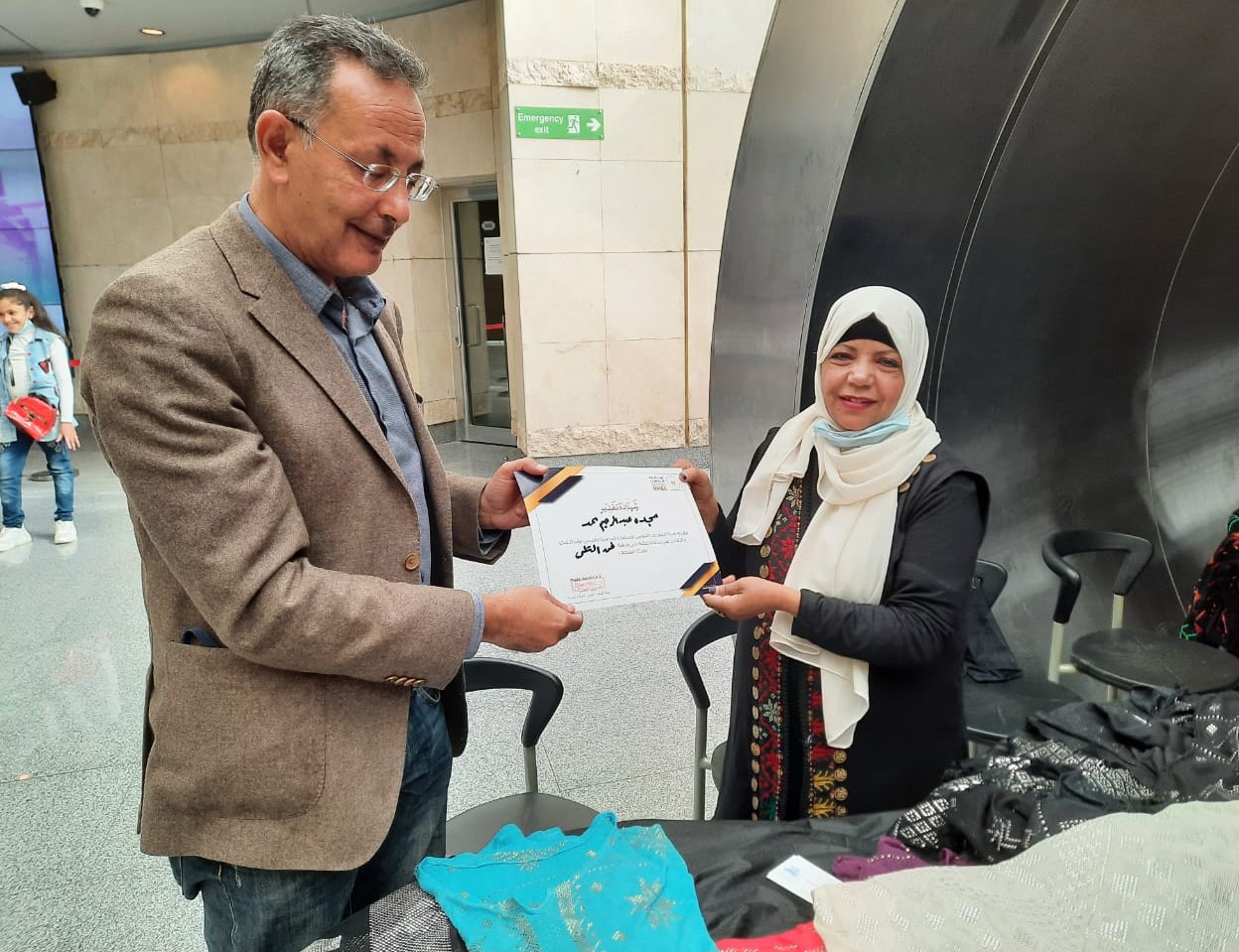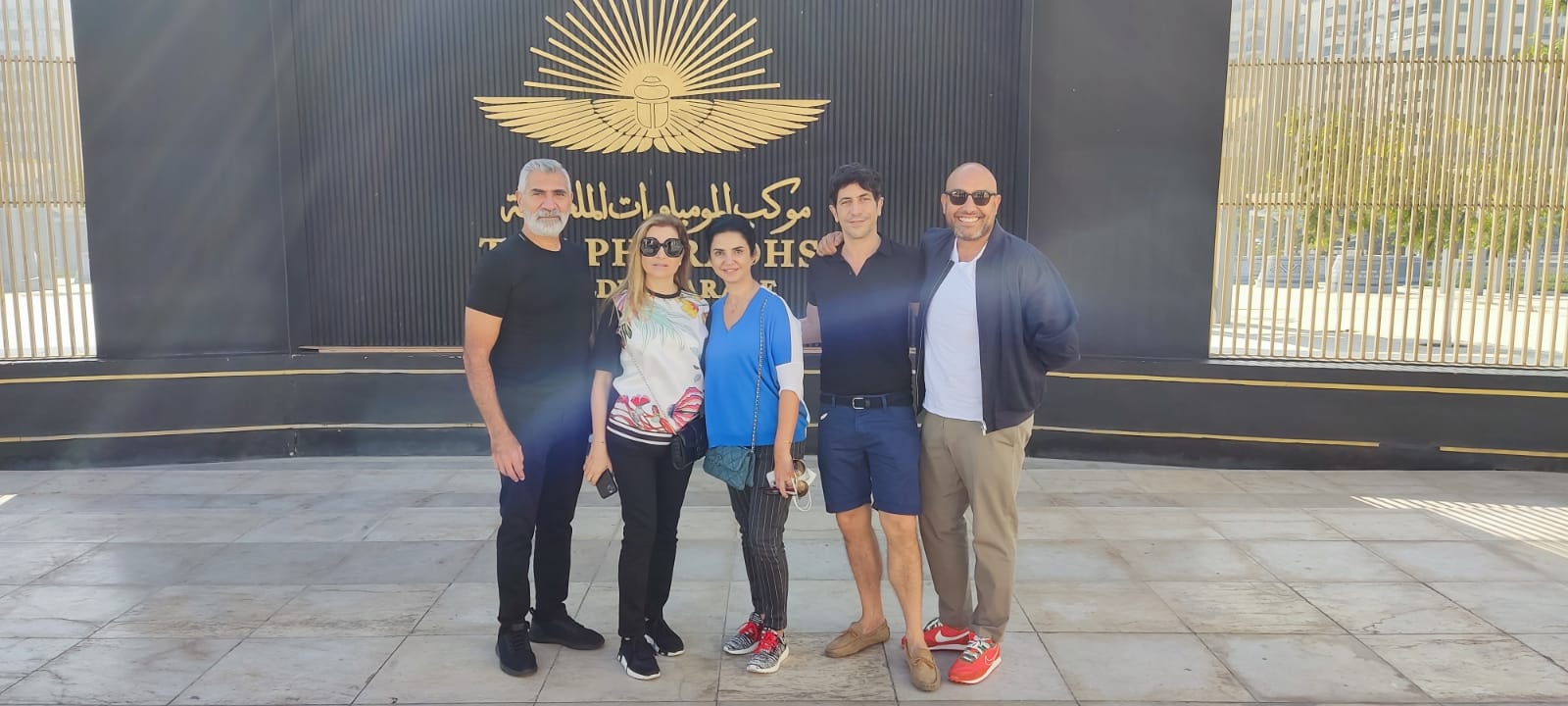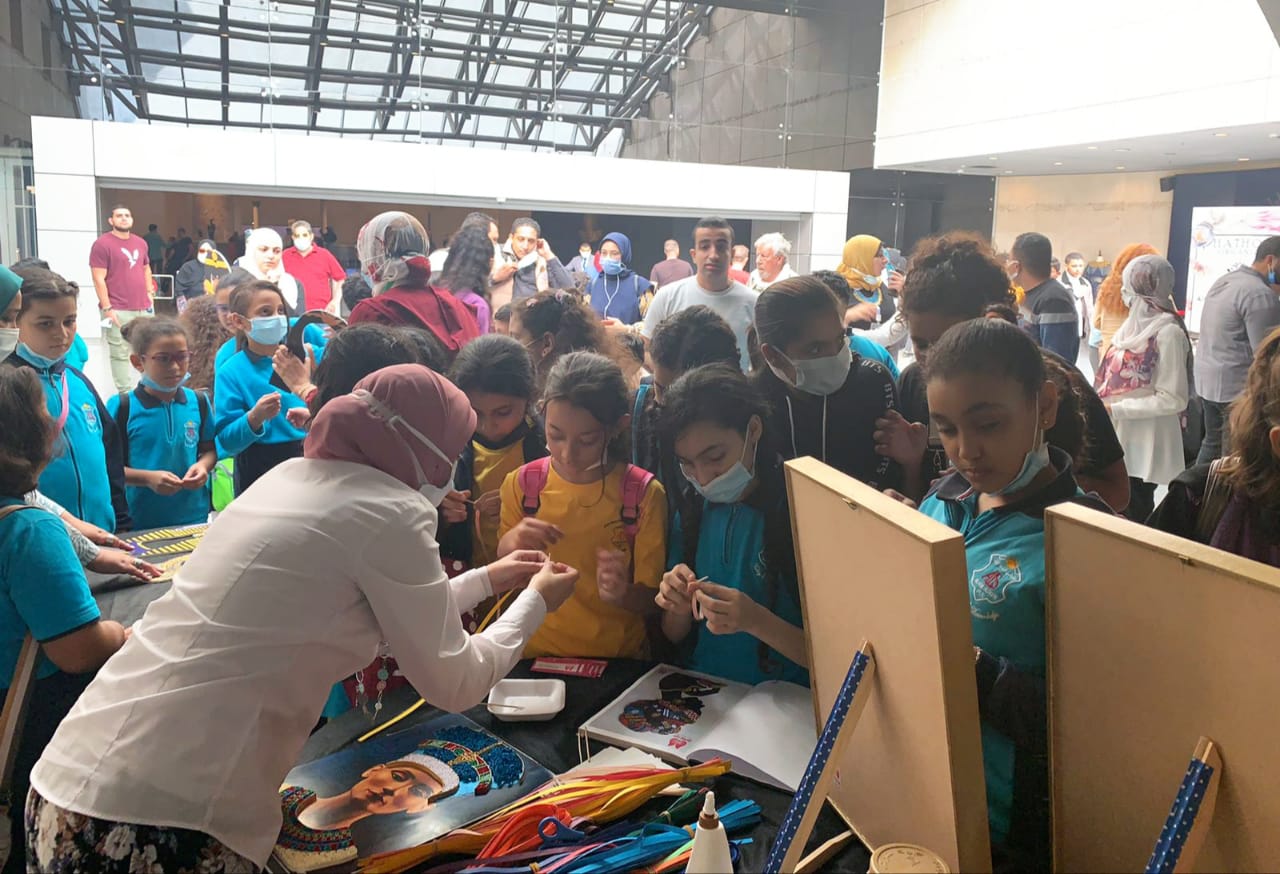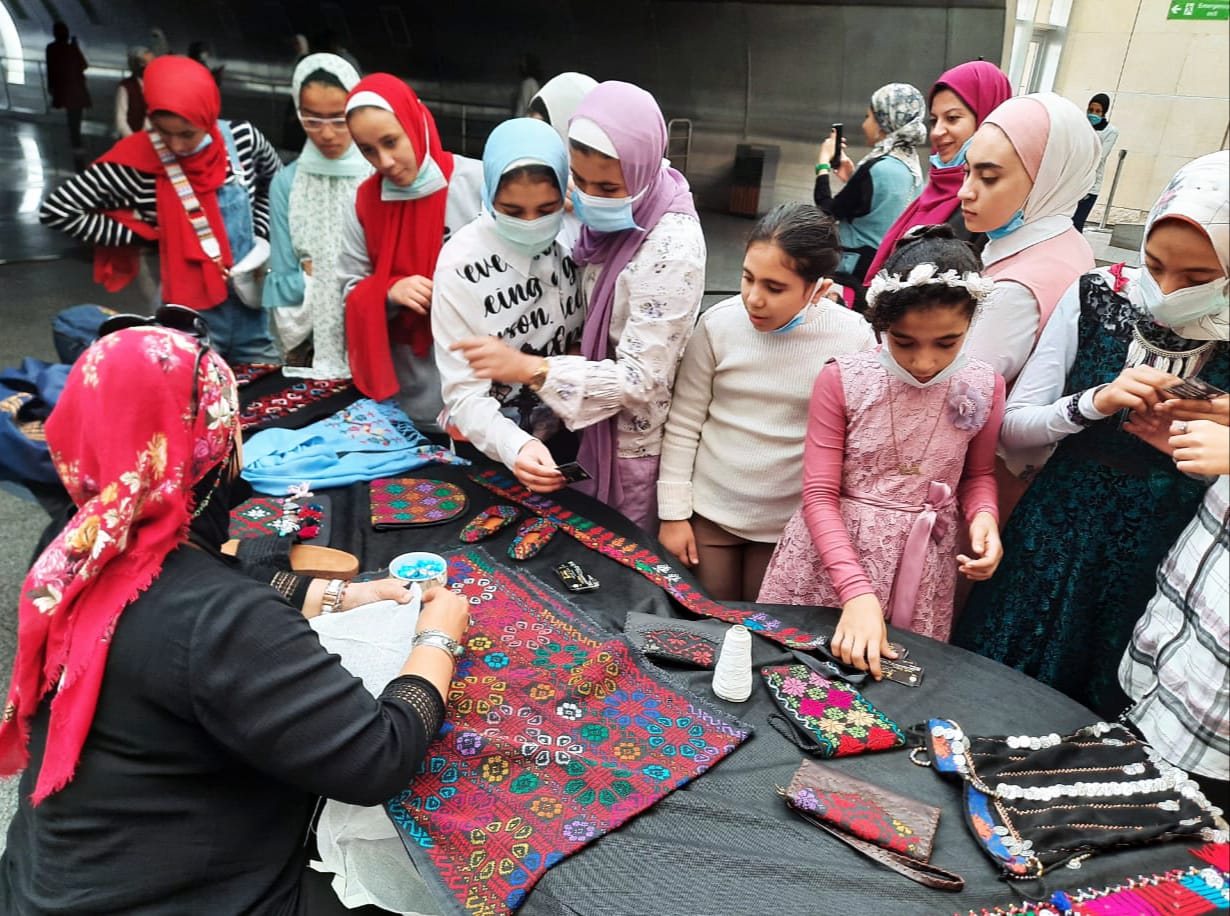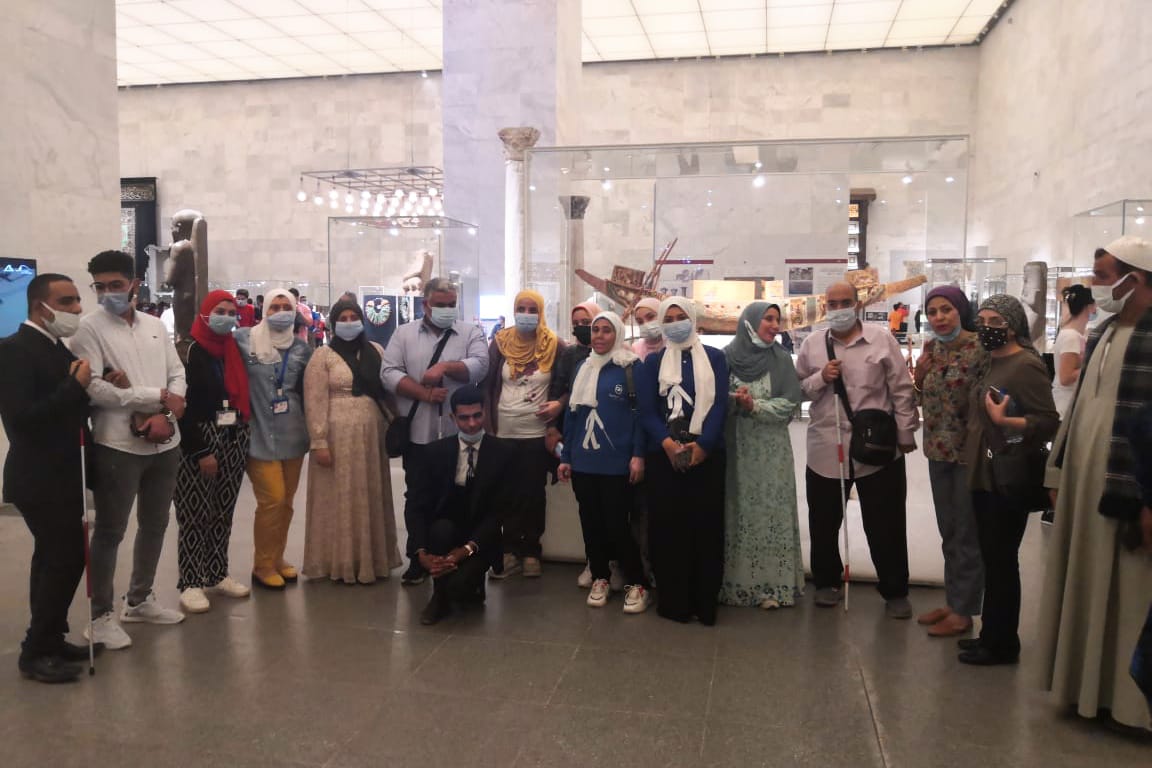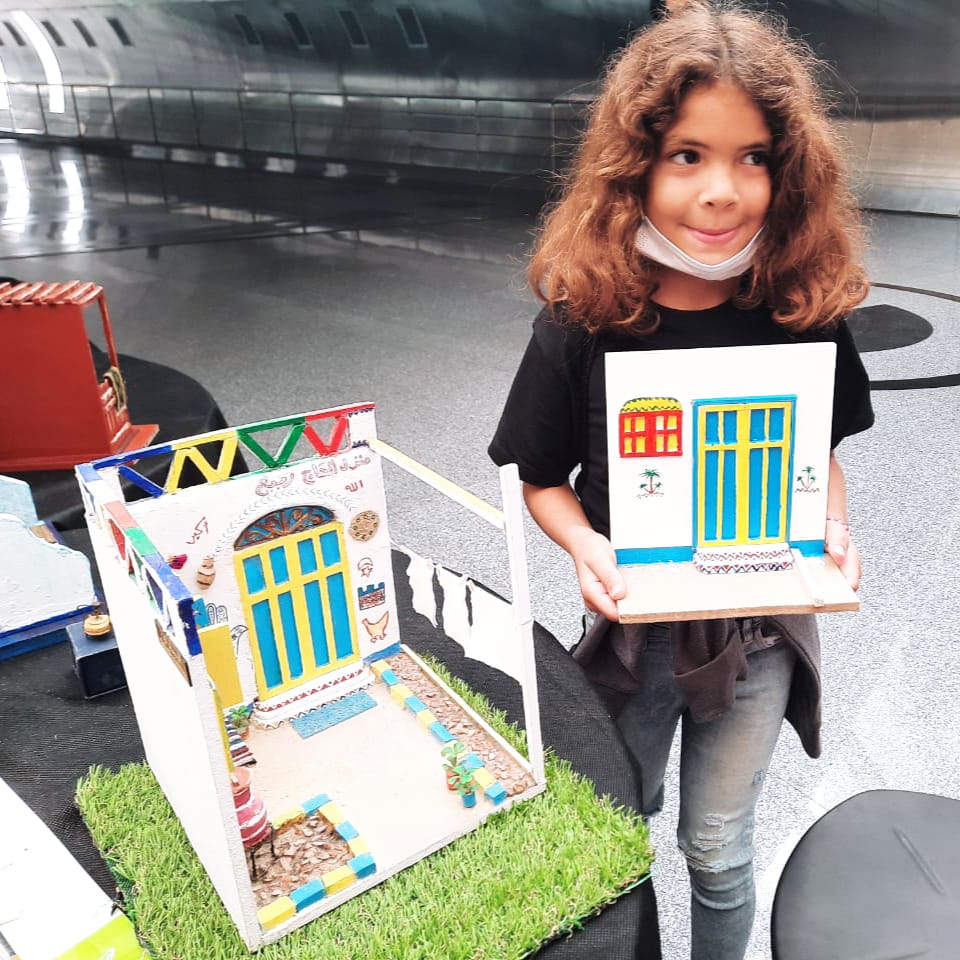National Museum of Egyptian civilisation received delegations from more than 42 countries participating in the Egypt International Defense and Military Industries Exhibition “EDEX 2021”, which was hosted by Egypt in addition to an African delegation of different nationalities during its current visit to participate in the meetings of the second session of the Egyptian-African Center for Training in the Field of regulation of Telecommunications.
NMEC organized for the general public a live workshop on the “Art of Tally”, one of Egypt’s most authentic craft and method of embroidery
The National Museum of Egyptian Civilization organized for the general public a live workshop on the “Art of Tally”, one of Egypt’s most authentic craft and method of embroidery. The workshop contributed to introducing the museum’s visitors to the Art of Tally, where they have learned the basics of hand embroidery on fabrics such as tulle and cotton, using gold and silver plated threads, to decorate garments with motifs such as geometric figures, plants, birds, people and camels among many others. Our audience have had the chance to try on some exquisite pieces made specially by an artisan from Shandaweel Island in Upper Egypt, as well as taking memorable photographs. It is worth-mentioning that
NMEC designs and delivers periodical free specialized workshops that suitable for different age groups, and such efforts are an essential element of NMEC’s cultural agenda, as they eventually inspire the museum’s visitors to get acquainted with the Egyptian civilization’s rich cultural heritage.
NMEC in Fustat received the family of the international Lebanese designer Elie Saab
On the occasion of International Children’s day
On the occasion of International Children’s day, and in light of the joint cooperation between NMEC and the Ministry of Culture, the National Museum of Egyptian Civilization presented “Rehlet el-Zaman el-Gameel” or “Journey of the Beautiful Time”; a puppet show produced by the Cairo’s Puppet Theater.
The storytelling revolves around a journey of a group of children to the Pharaonic era, mainly during the reign of King Akhenaten, the tenth ruler of the Eighteenth Dynasty. It also included an illustration of the Egyptian oral heritage, in order to consolidate the tangible and intangible cultural heritage in the minds of children.
Written by Yehya Zakaria, directed by Mohamed Anwar and composed by Karim Arafa the show was held for three consecutive days from Saturday 11/20/2021 to Monday 22/11/2021 at NMEC’s theater. Ms. Azza Rizq from the Department of Museum Education, on the other hand, stated that NMEC warmly welcomed students from various public and private schools, orphanages, associations for the visual and hearing impaired people of determination, as well as delegations from the Ministry of Tourism and Antiquities and their families, highlighting.
NMEC in Fustat received the Italian Ambassador in Cairo, His Excellency; Michele Quaroni, accompanied by the the Cultural Counselor of the State of Italy in Egypt and the Director of the Italian Cultural Institute; Professor Davide Scalmani, and Dr. Josephina Caprito, the Director of the Italian Archaeological Institute.
The National Museum of Egyptian Civilization in Fustat received the Italian Ambassador in Cairo, His Excellency; Michele Quaroni, accompanied by the the Cultural Counselor of the State of Italy in Egypt and the Director of the Italian Cultural Institute; Professor Davide Scalmani, and Dr. Josephina Caprito, the Director of the Italian Archaeological Institute.
The visit came within NMEC’s strategy to enhance and exchange means of cooperation at the tourism, cultural and archaeological fields.
The delegation was received by Dr. Ahmed Ghoneim, the Managing Executive Director of NMEC, where he was accompanied by NMEC’s Chief Curator; Ms. Marian Adel. Together, the delegation toured the museum’s halls to get acquainted with NMEC’s distinguished narrative and artifacts that emphasize the Egyptian Civilization’s pioneering role in various fields such as sciences, arts, literature among several others. Moreover, the delegation navigated NMEC’s facilities and its scientific laboratories, where they expressed their delightfulness and praised its technologies and great capabilities.
At the end of their tour, His Excellency emphasized the necessity for conducting mutual cultural and expertise-sharing programs between the two parties. For his part, Dr. Ahmed Ghoneim, explained his keen interest in building civilized intellectual and cultural dialogue with countries of the world, stressing the importance of such initiative as a key enabler for developing Egypt’s tourism sector.
A series of workshops on “Queen Tiye’s Secret” conducted at the National Museum of Egyptian Civilization.
The National Museum of Egyptian Civilization organized on Wednesday, November 10th 2021, a spectacular live event on “Queen Tiye’s Secret”. The event consisted of series of live workshops conducted for the general public, where NMEC’s visitors were introduced to the secrets of the beauty and splendor of women in ancient Egypt, especially of Queen Tiye’s, who has been famous for her beautiful, thick hair. The workshops were conducted by a team of experts and entrepreneurs in the field of cosmetics, hair and skin care, that have introduced the visitors to the techniques of preparing homemade beauty products, as well as natural hair and skincare routines, extracted from natural and accessible ingredients. The event has witnessed a remarkable interaction among the museum’s visitors, especially the youth, whom participated in the events’ various activities such as recreating the face of Queen Tiye through the exquisite art of paper quilling. And to enrich the visitors’ experience, NMEC conducted series of seminars that offered a brief introduction on Egypt’s Queens, their beauty care routines and hair styling techniques. While Dr. Moustafa Ismail, the Head of the Mummies Maintenance Laboratories, delivered a lecture on the full procedure of conserving queen Tiye’s mummy, as well as the researchers conducted to reveal the secret behind the queen’s thick hair locks. The event was concluded by presenting the participants certificates of appreciation by NMEC’s Managing Executive Director; Dr. Ahmed Ghoneim.
A live workshop on the Traditional Art of Sinai’s Embroidery, at The National Museum of Egyptian Civilization
As part of NMEC’s responsibility to preserve and promote the tangible and intangible cultural heritage of Egypt, the National Museum of Egyptian Civilization organized on Saturday, November 6th 2021, a live workshop for the general public, on the Traditional Art of Sinai’s Embroidery.
The event has witnessed a remarkable interaction among the museum’s visitors, especially the youth, who were keen to follow up on the live work, and have involved in direct discussions with artisans. Through the live workshop, NMEC’s visitors were offered a unique opportunity to examine the basic elements of embroidery, the variety of stitches, as well as the pre-determined elements and colors used in decorating traditional Bedouin costumes, besides a wide range of decorative products.
Mrs. Fayrouz Fekry, the Deputy Director for Management and Operation at NEMC, emphasized that NMEC designs and delivers free specialized workshops suitable for different age groups, and such efforts are an essential element of NMEC’s policy, as they eventually
inspire the museum’s visitors to get acquainted with the Egyptian civilization’s rich cultural heritage.
The National Museum of Egyptian Civilization in Fustat welcomes a delegation of ambassadors of Latin American countries in Cairo.
The National Museum of Egyptian Civilization continues to receive a number of international dignitaries, government officials and public figures from Egypt and the world since its grand opening in April this year. For instance, NMEC received a delegation of ambassadors of Latin American countries in Cairo, accompanied by His Excellency Ambassador Ashraf Mounir, Deputy Assistant Foreign Minister for Latin American Affairs, where they were welcomed by Dr. Ahmed Ghoneim, Managing Executive Director of NMEC. Accompanied by Mrs. Fayrouz Fekry, Deputy Director for Management and Operation at NEMC, and Mr. Bassem Raouf, NMEC’s Chief Curator, the delegation have toured the museum’s spacious galleries such as the Core Exhibition Hall and the Royal Mummies Hall to get acquainted with its distinguished artifacts and its breathtaking archeological treasures. Moreover, the delegation have been introduced to the museum’s impressive facilities and its offered activities, emphasizing that NMEC, besides its principal role of preserving antiquities, aspires to be a hub that celebrates Egypt’s cultural heritage and unique civilization. At the end of their visit, the delegation expressed their delightfulness with their overall experience at NMEC, highlighting their admiration towards the uniqueness of Egypt’s civilization and the museum’s rich collections that are well-developed through its narrative.
NMEC organizes a cultural program for the visually impaired people of determination on the occasion of White Cane Safety Day.
The National Museum of Egyptian Civilization, in cooperation with the Cultural Development and Community Communication Department in the Office of the Minister of Tourism and Antiquities, and public associations aiding the blind and visually impaired, organized a cultural program for the visually-impaired People of Determination on the occasion of the “White Cane Safety Day”. The cultural program aimed at encouraging blind and visually impaired people to master the use of white cane as a tool of mobility, as well as to raise social awareness within the sighted population on improving the communications’ channels with the visually-impaired People of Determination.
Dr. Ahmed Ghoneim, Managing Executive Director of NMEC, emphasized that NMEC seeks to provide an accessible cultural and educational platform that ensures inclusion and equal participation for the museum’s audience, regardless of their physical disabilities and sensory impairments. Ms. Azza Abd El Maqsoud from the Department of Museum Education highlighted that the event included a guided tour for the participating visually-impaired People of Determination, where they were introduced to Egypt’s Civilization from prehistoric times to the present day. On the other hand, Dr. Rasha Kamal, General Director the Cultural Development and Community Communication Department in the Office of the Minister of Tourism and Antiquities, has designed a set of interactive, post-visit activities, highlighting their importance in enhancing the cognitive and affective learning outcomes, specially for children. Dr. Kamal has emphasized that such participatory events come as part of the Ministry’s strategy to raise children’s cultural and historical awareness.
A live workshop conducted at NMEC on the Art of Diorama.
As part of NMEC’s responsibility to preserve and promote the tangible and intangible cultural heritage of Egypt, the National Museum of Egyptian Civilization organized on Saturday, October 23rd, 2021, a live workshop for the general public, on the Art of Diorama. The event has witnessed a remarkable interaction among the museum’s national and international visitors, especially the youth, who were keen to follow up on the live work and document it on social media. The workshop introduced the museum’s visitors to the basics of constructing a small-scale diorama, from sketches to complete scenes. In addition, NMEC’s visitors had the chance to briefly learn about the history of Diorama, which dates back to 7000 years, where ancient Egyptians have depicted sceneries from their lives and daily routine using small-scale, three-dimensional figures. The word “Diorama” was invented in the 19th century as a type of picture-viewing device, that depicts a landscape, typically showing historical events, nature scenes or cityscapes, with a number of miniature, three-dimensional figures, that are set in lifelike poses, and viewed through a peephole, usually manufactured for purposes of education or entertainment. Dr. Ahmed Farouk Ghoneim, Managing Executive Director of NMEC highlighted that Diorama is widely used in major natural and history museums, as well as in cinemas and theaters, to convey a narrative for specific scenes, aiming at inspiring and educating the public.
